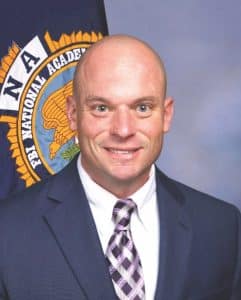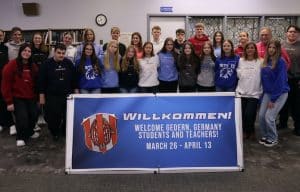Donjon brings FBI training to CPD

Columbia Deputy Police Chief Jason Donjon now counts himself among the select few who have completed the FBI National Academy, as he recently completed that training and brought his newfound expertise back to the Columbia Police Department.
“This was the best (training) I’ve ever had,” Donjon said, noting he was with a group of experienced officers for an extended period of time. “It was great to be able to get away from work. I could see email of what was going on, but it was nice to get away and focus on the training.”
Founded in 1935, the FBINA is a professional course of study for U.S. and international law enforcement managers who demonstrate leadership qualities.
The 10-week program provides coursework on topics like intelligence theory, terrorism, management science, law, behavioral science, law enforcement communication and forensic science.
The goal of the academy, according to its website, is “to improve the administration of justice in police departments and agencies… and to raise law enforcement standards, knowledge and cooperation worldwide.”
Law enforcement officers ranked higher than sergeant can participate in the academy by invitation only, and they only receive an invitation after being nominated by a superior officer.
Donjon first applied for the academy three years ago, but was only accepted in the fall.
Although he is the only Monroe County officer he knows who has attended the training, Donjon said he spoke to other police personnel who praised it, which made him want to apply.
“I’ve talked to some other guys who went and they just raved about it,” he said. “They said the training was unbelievable.”
Once he learned he had been accepted into the academy, Donjon completed the remaining requirements – like passing a few physical tests – and headed to Quantico, Va.
The academy, which the FBI pays for officers to attend, ran Jan. 6 to March 13, and Donjon was with a class of 255 people from every state.
There were also 38 international students, including Donjon’s roommate, who was from the country of Colombia.
“We’re good friends now,” Donjon noted.
A typical day at the FBINA begins with classes at 7:30 a.m., followed by lunch, afternoon classes and time to complete assignments in the evening.
Donjon said the training focused on three key tiers: knowledge, physical fitness/wellness and networking.
In that first area, Donjon said there were classes on subjects like employment law, interviewing techniques and working with the community, but the focus was on the “wellness and resiliency of officers.”
“We go to a lot of training as police officers about search and seizure or law updates, and that’s all great stuff and very important,” Donjon explained. “But our profession rarely talks about the wellness of our officers, the wellness of the community and how this job does take its toll.”
Donjon said that often took the form of participants sharing perspectives from their law enforcement agencies, which led them to realize they had similar problems such as hiring and retention.
He also said those discussions helped reinforce how positively Monroe County treats law enforcement, which is beneficial.
“What they kept stressing was a lot of the old-time police work was ‘us’ versus ‘them,’ which is just not how it is anymore and not how we want it to be,” Donjon said. “We want it to be, ‘we work with the public and our community.’”
In terms of physical fitness, Donjon said one of the classes focused on that, with attendees mainly doing interval training.
Each week there was also a challenge for officers to complete, culminating in a 6.1-mile run through a hilly, wooded trail built by Marines that includes obstacles like walls that must be scaled or barbed wire that must be crawled under.
Donjon described that experience as “very fun.”
“They made it fun and they understood everybody was at a different physical level, so they worked with everybody,” he said of the physical fitness overall. “It wound up being one of my favorite parts of the academy.”
Donjon is already putting the networking element to use, as he is communicating with officers he met at the academy and some who went before him to help develop new policies and procedures for the CPD focused on officer wellness.
Working with those people and local organizations, such as Human Support Services, Donjon hopes to help Columbia’s police officers cope with their jobs and, by extension, better serve the community.
“We have to take care of our officers, and if we do that, it helps the community,” Donjon said. “If you have an officer whose struggling with something they saw or just the grind of the job, they’re not going to be useful and productive in their community.”






